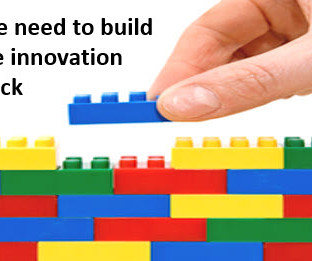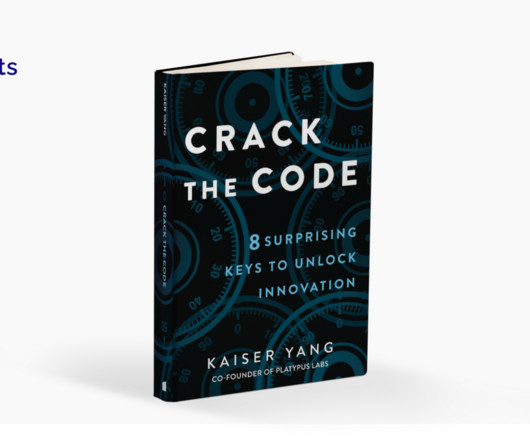How “Perspective Swaps” Can Unlock Organizational Change
Harvard Business Review
MAY 16, 2023
Stepping into a colleague’s shoes can reveal surprising new ways of thinking.

Harvard Business Review
MAY 16, 2023
Stepping into a colleague’s shoes can reveal surprising new ways of thinking.

HYPE Innovation
MAY 15, 2023
Knowledge sharing and innovation In the 1970s, Walker’s Wagon Wheel Tavern sealed its role in innovation history. Its name perfectly captured what took place there – like spokes on a wheel, people converged and the air was full of conversation on a Friday night. Ideas flew around, many of which crashed and burned. But some fused, became something bigger, gained momentum, and grew into new businesses.
This site is protected by reCAPTCHA and the Google Privacy Policy and Terms of Service apply.

Paul Hobcraft
MAY 19, 2023
Developing the innovation stack takes the view that innovation is a series of building blocks stacked on top of each other with different layers to work through. These stacks follow an established logic, such as working through idea discovery, relating to given problems, exploring solutions, and determining the final model or design and the execution delivery to achieve this.

IdeaScale
MAY 14, 2023
In the first part of our three-part series, we discussed the unique challenges of innovating in India. In this second part, we will explore how these challenges have their origins in India's culture, history, and institutional structures. Regulatory Challenges: A Legacy of Colonialism India's regulatory environment is a legacy of its colonial past, although [.

Speaker: Conrado Morlan
In this engaging and witty talk, we’ll explore how artificial intelligence can transform the daily tasks of product managers into streamlined, efficient processes. Using the lens of a superhero narrative, we’ll uncover how AI can be the ultimate sidekick, aiding in decision-making, enhancing productivity, and boosting innovation. Attendees will leave with practical tools and actionable insights, motivated to embrace AI and leverage its potential in their work. 🦸 🏢 Key objectives:

Innovation Excellence
MAY 14, 2023
GUEST POST from Pete Foley Most innovations go through a similar cycle, often represented as an s-curve. We start with something potentially game changing. It’s inevitably a rough-cut diamond; un-optimized and not fully understood. But we then optimize it.

Digital Tonto
MAY 14, 2023
The neuroscientist Antonio Damasio believes we encode experiences in our bodies as somatic markers and that our emotions often alert us to things that our brains aren’t aware of. Another researcher, Joseph Ledoux, had similar findings. He pointed out that our body reacts much faster than our mind, as when we jump out of the way of an oncoming object and only seconds later realize what happened.
Business Innovation Brief brings together the best content for business innovation and strategy professionals from the widest variety of industry thought leaders.

IdeaScale
MAY 19, 2023
IdeaScale, the leading idea management solution for government, announced it has secured its 8th Federal Risk and Authorization Management Program (FedRAMP®) Authorization to Operate (ATO). IdeaScale is the only FedRAMP certified idea and innovation management software, and each new designation solidifies their standing as an industry leader. Their 8th FedRAMP ATO comes from Defense Counterintelligence [.

HYPE Innovation
MAY 18, 2023
For decades, c rowdsourcing has been a n important idea-generation method for many companies. By bring ing together a diverse and broad community of people, this type of open innovation has the potential to uncover powerful solutions and solve complex problems. If carried out well , crowdsourcing u nit es the "crowd" in pursuit of the common goal of gathering cutting-edge innovation knowledge and insights.

Jeffrey Phillips
MAY 15, 2023
In uncertain times, where do you turn for insight and answers? Most often, it seems, we turn to what we know and trust. Older tools and models that have proven themselves over time. In the uncertainty we face today (this post was written in May 2023), many business leaders are facing uncertainty about what strategies to implement, what plans to make.

Harvard Business Review
MAY 19, 2023
As the world reckons with the impact of powerful new AI systems, governments are jostling to lead the regulatory charge — and shape how this technology will grow.

Advertisement
The complexity of financial data, the need for real-time insight, and the demand for user-friendly visualizations can seem daunting when it comes to analytics - but there is an easier way. With Logi Symphony, we aim to turn these challenges into opportunities. Our platform empowers you to seamlessly integrate advanced data analytics, generative AI, data visualization, and pixel-perfect reporting into your applications, transforming raw data into actionable insights.

IdeaScale
MAY 17, 2023
What is Quantitative Market Research? Quantitative market research is defined as a type of research that involves the collection and analysis of numerical data to understand market trends, consumer behavior, and other business-related variables. It typically involves surveying a large sample of people or a target audience to gather data using surveys, polls, or questionnaires, [.

HYPE Innovation
MAY 18, 2023
For decades, c rowdsourcing has been a n important idea-generation method for many companies. By bring ing together a diverse and broad community of people, this type of open innovation has the potential to uncover powerful solutions and solve complex problems. If carried out well , crowdsourcing u nit es the "crowd" in pursuit of the common goal of gathering cutting-edge innovation knowledge and insights.

Entrepreneur - Innovation
MAY 17, 2023
Artificial intelligence is proving to be a capable assistant in countless workplaces. But when it comes to leadership, there's just no alternative for good communication other than human touch.

helloFUTURE
MAY 15, 2023
If you’re reading this, chances are you’re part of a forward-thinking organization or an enterprising startup that’s ready to make waves in your industry. You’ve probably heard the term “culture of innovation” thrown around in countless meetings, and it’s likely that you’ve pondered how to instill this within your own team.

Speaker: Aaron Jacob, VP of Accounting Solutions & Reagan Cook, GTM Lead
Are you struggling to navigate the complexities and challenges that come with crypto accounting? 🤔 This new webinar will cover everything businesses need to know to get started with crypto accounting after incorporating crypto into their business models! Industry experts Aaron Jacob and Reagan Cook of TaxBit will thoroughly explore the prevalent operational hurdles encountered by accounting teams when interacting with crypto on the books, and detail how software solutions can effectively

IdeaScale
MAY 17, 2023
What is Customer Experience (CX) Research? Customer experience (CX) research is defined as the method of systematically studying and analyzing customer interactions and perceptions, throughout their journey with a company or brand with the goal of improving these experiences. It involves gathering data and insights to understand customers' expectations, needs, preferences, and overall satisfaction with [.

Qmarkets
MAY 19, 2023
Crack The Code is the eye-opening book about innovation mindsets and creativity from Kaiser Yang, co-founder of US-based innovation consultancy and Qmarkets partner Platypus Labs. Listen to this exclusive free audio version to discover eight game-changing tactics to dramatically improve your organization's capacity for innovation, and drive success for your program.

Harvard Business Review
MAY 17, 2023
Managers should focus on helping employees maintain their passion over time — not just stoking it in the moment.

Entrepreneur - Innovation
MAY 17, 2023
As we face a revolutionary technology, we should spend less time on what it will take away, and more time on how we will leverage it to create and accomplish more.

Speaker: Corey Daugherty, Head of Business Development at Flowcode & Georgette Malitsis, Senior Customer Success Manager, Enterprise at Flowcode
Let's explore the transformative power of QR codes in bridging offline and online marketing worlds. 📲 This new webinar featuring Corey Daugherty and Georgette Malitsis of Flowcode will dive into how innovative QR technology not only enhances traditional marketing strategies, but also drives meaningful customer engagement and analytics. Register today to gain practical knowledge on using QR codes to increase conversion rates, optimize customer journeys, and ultimately unlock a new realm o

IdeaScale
MAY 17, 2023
What is focus group research? Focus group research is defined as a qualitative research method used to gather data from a small, diverse group of people in a facilitated group discussion. This method is commonly used in marketing and social science research to gain insight into the opinions, attitudes, and perceptions of a target audience. [.

Innovation Excellence
MAY 19, 2023
GUEST POST from Mike Shipulski Companies have control over one thing: how to allocate their resources. Companies allocate resources by deciding which projects to start, accelerate, and stop; whom to allocate to the projects; how to go about the projects; and whom to hire, invest in, and fire. That’s it.

Harvard Business Review
MAY 17, 2023
Connecting a project to core principles — and explaining how it will benefit stakeholders — can spark the motivation required for success.

Entrepreneur - Innovation
MAY 17, 2023
Just one egg-freezing cycle can cost upwards of $10,000. Cofertility co-founders Lauren Makler, Halle Tecco and Arielle Spiegel are giving women another option.

Speaker: Kat Conner
The challenge of delivering the right product at the right time while aligning with strategic objectives is more pressing than ever. Product management is evolving and gaining greater recognition as the means to creating this connection. Join our upcoming webinar and learn how to streamline your product development processes, infuse product thinking across the organization, and bridge the gap between vision and delivery.

IdeaScale
MAY 17, 2023
What is Quantitative Research? Quantitative research is defined a research method that focuses on collecting and analyzing quantifiable data to draw conclusions and make predictions. It involves using statistical and mathematical methods to analyze data, which is usually obtained through structured surveys, experiments, answering research questions, or other forms of controlled data collection.

Christensen Institute
MAY 19, 2023
Each year, 1 in 5 adults in the US experience mental illness, and 1 in 6 youth experience a mental health disorder. The US is in a mental health crisis. In October 2021, health professionals from the American Academy of Pediatrics, American Academy of Child and Adolescent Psychiatry, and Children’s Hospital Association declared a national state of emergency in child and adolescent mental health.

Innovation Excellence
MAY 15, 2023
GUEST POST from Greg Satell A recent Pew poll found that, while Americans generally view scientific expertise in high regard, there are deep pockets of mistrust. For example, less than half of Republicans believe that scientists should take an active role in policy debates and significant minorities question the transparency and integrity of scientific findings.

Harvard Business Review
MAY 18, 2023
Our ability to manage change hinges on our ability to manage ourselves, including our fears and anxieties.

Advertisement
In the fast-moving manufacturing sector, delivering mission-critical data insights to empower your end users or customers can be a challenge. Traditional BI tools can be cumbersome and difficult to integrate - but it doesn't have to be this way. Logi Symphony offers a powerful and user-friendly solution, allowing you to seamlessly embed self-service analytics, generative AI, data visualization, and pixel-perfect reporting directly into your applications.

IdeaScale
MAY 17, 2023
What is Qualitative Observation? Qualitative observation is defined as a research approach that seeks to understand social, cultural, and psychological phenomena through non-numerical data. It is a method of collecting and analyzing data that emphasizes the subjective experiences of individuals, the importance of understanding the context in which behavior and events occur, and the flexibility [.

Christensen Institute
MAY 16, 2023
As a restaurant manager, how would you feel if you were suddenly tasked with inspecting the food in your own kitchen? Or as a gymnastics coach, how would you react if you were asked to score your own team’s performances in a competition? It’s clear that when one person is both a manager or coach and an evaluator, conflicts of interest can arise.

Innovation Excellence
MAY 17, 2023
GUEST POST from Stefan Lindegaard How can we embrace and implement the growth mindset and psychological safety in our organization? How can we train our people and in particular our leaders on this? How do we get better at shaping the future?

Harvard Business Review
MAY 15, 2023
Five ways remote workers, freelancers, and contractors can stay top of mind — even when out of sight.

Speaker: Maher Hanafi, VP of Engineering at Betterworks & Tony Karrer, CTO at Aggregage
Executive leaders and board members are pushing their teams to adopt Generative AI to gain a competitive edge, save money, and otherwise take advantage of the promise of this new era of artificial intelligence. There's no question that it is challenging to figure out where to focus and how to advance when it’s a new field that is evolving everyday. 💡 This new webinar featuring Maher Hanafi, VP of Engineering at Betterworks, will explore a practical framework to transform Generative AI pr
Let's personalize your content